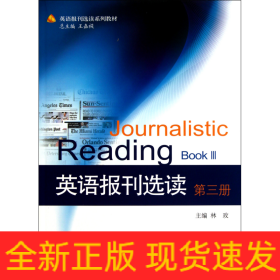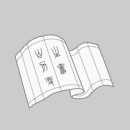
英语报刊选读(第3册英语报刊选读系列教材)
全新正版 极速发货
¥ 18.49 6.2折 ¥ 30 全新
库存2件
广东广州
认证卖家担保交易快速发货售后保障
作者林玫|主编:王嘉禔
出版社北京大学
ISBN9787301181102
出版时间2011-02
装帧平装
开本其他
定价30元
货号1940516
上书时间2024-05-30
- 最新上架
商品详情
- 品相描述:全新
- 商品描述
-
商品简介
目录
Unit 1 The Time P00
Unit 2 The Newsweek 50
Unit 3 The World in 2009
Unit 4 Business and Life
Unit 5 Courtesy
Unit 6 Japan
Unit 7 Afghanistan
Unit 8 Pakistan
Unit 9 India
Unit 10 Haiti
Unit 11 Education
Unit 12 Science and technology
Unit 13 Health care and technology
Unit 14 Globalization
Unit 15 Production
内容摘要
《英语报刊选读(第3册)》分为四册,本册十五个单元,选材既涉及与生活体验同质的校园、娱乐、育方面,也有各类报刊中常见的医学、心理学、艺术、文化方面,在第三、四册我们还国家为线索,选用了关于日本、印度、伊朗、伊拉、巴基斯坦、以色列等热点问题较集中的国家和地区。靠前、二册每单元包含两篇文章,总字数控制在2000个单词以内;三、四册包含两到三篇文章,总字数约为3000个单词。每个单元分三个部分,结构如下:
靠前部分(SectionA)是教学前的辅助材料,包括:
导读(Lead-in)介绍英?国家的主要报纸、杂志等,或简单讲解与本单元有关的背景知识。
热身问题(Warm-upQuestions)集中体现在靠前、二册,用几个与本单元相关的问题引出课文。
第二部分(SectionB)是教材的课文部分,包含两至三篇相关题材的报道。其中靠前、二册每单元两篇文章,每篇文章约为800-900个单词;第三、四册每单元两至三篇文章,每篇文章1000个单词以上。
第三部分(SectionC)是教材的练习部分,分为词汇、句型和篇章三个类别。
精彩内容
But power in America and elsewhere is undergoing directional changes that com-plicate Mills's argument. Yes, there are still cultural arbiters, and yes, presidentsand lawmakers and executives obviously exert enormous influence. It is arguable,though, that technology has given us a more democratic culture ( if not politics) thanthe world has seen since perhaps the founding of Athenian democracy. In ways thatwe are still only beginning to understand, the Internet is changing how power is ac-cumulated and exercised.
This is a subject that A1 Gore——who knows a lot about the vicissitudes of for-tune——understands well. In Gore's thinking, we are now in the midst of a great turn-ing point in the history of power, a moment akin to the introduction of the printingpress in Europe in the mid-15th century. The proliferation of printed informationhelped fuel the rise of democracy until, in Gore's view, television replaced print asthe central political medium. Now the Internet has, like Gutenberg, lowered barriersto information and has given virtually anyone with something to say the means to sayit. The Web is not only a source but a stage on which we can engage in the life ofthe nation and of the world armed with facts we have weighed in the light of reason.Knowledge is now once again connected to power,says Gore——and that is a kindof power which means all of us belong on a list like this.
……
— 没有更多了 —












以下为对购买帮助不大的评价